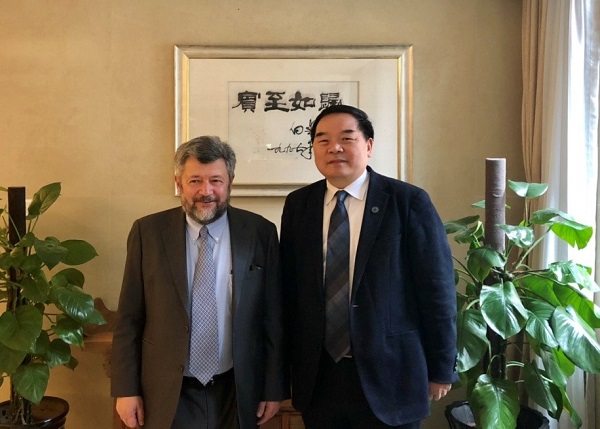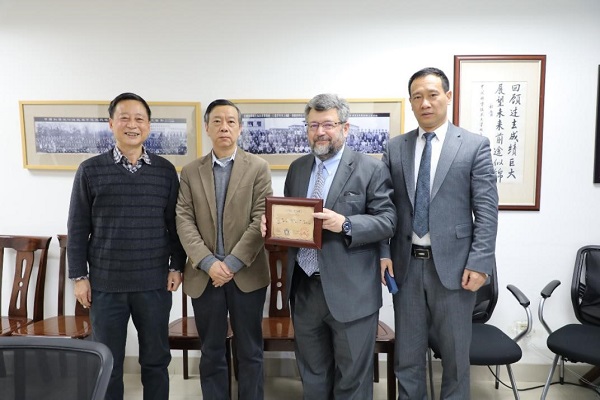Mathematician Efim Zelmanov Visited USTC and Gave Lectures
On Dec 14th, mathematician Efim Zelmanov, one recipient of the 1994 Fields Medal, has been invited to USTC and congratulated USTC on his remarkable achievements over the past six decades.

BAO Xinhe, president of USTC, met with Professor Efim Zelmanov.
At a meeting focused on the ongoing opportunities for student cultivation and faculty mobility in the field of mathematics between China, the United States and Russia, Prof Efim Zelmanov, Prof YE Xiangdong, and Prof GUO Wenbin of the School of Mathematical Sciences exchanged views in hoping to expand further cooperation.

A group photo during the meeting
In the afternoon, Prof Efim Zelmanov shared his thoughts on mathematics at a symposium with teachers and students and delivered a lecture at the Forum of Great Minds which is co-organized by Hefei Science and Technology Bureau and USTC. Themed as “Mathematics: Science or Art”, the lecture was chaired by Professor OUYANG Yi of the School of Mathematical Sciences.
Encouraged by his teacher, Prof Zelmanov was attracted by the mysterious charm of mathematics when he was twelve years old. “For more than two thousand years, mathematics has always been regarded as intrigued for its two sides: the one side that focuses on solving practical problems in production and life, while the other side that focuses on pure proofs.” The professor said in his lecture, “However, the two sides of mathematics are inseparable. For example, the finite field invented by Galois was originally a completely abstract mathematical concept that was once thought to be irrelevant with the real world, but the fact eventually sees its strength in space exploration and cryptography.” He reminded the students of the course of biology and mathematics of the former Soviet Union, “Every branches of mathematics, like a plant, are twined and twisted. If you chop down the “the unnecessary part”, the plant will die soon.”

“Mathematics: Science or Art” at the Forum of Great Minds
“Computer could be a good experimental tool, in particular in the field of number theory, and could produce some interesting mathematical problems, but actually artificial intelligence could only be used in few tasks. Especially the pattern recognition, it cannot replace human’s thinking and creation,” He expressed his views on whether the vigorous development of artificial intelligence could replace human beings in abstract thinking.

Professor Efim Zelmanov visited the Museum of USTC and shows great interest.
In the morning of Dec 15th, Prof Efim Zelmanov gave another lecture themed as Inspiration of a Mathematician in Hefei No.1 High School. As the world sees greater application of mathematics in cryptographic transmission, ranking of search results, medical imaging and geological mapping, he explained in his lecture why people should attach importance to mathematics. Then, he shared his own growth stories and learning experience, emphasizing to the young the significance of having a good teacher who guides your learning.
During the free question, Prof Zelmanov emphasized the importance of practice in mathematics learning. “Learning mathematics requires practice. I hope you students to read more books about mathematics and learn more beyond textbooks,” he said.
As a lecture professor at the University of California, San Diego, the Russian-American mathematician is known for his work on combinatorial problems in nonassociative algebra and group theory, including the solution of the restricted Burnside problem. Professor Efim Zelmanov has been awarded a Fields Medal, which is awarded every four years to the most accomplished mathematicians in the world under the age of 40, at the International Congress of Mathematicians in Zürich in 1994.
(Written by XU Yue, edited by YANG Xinqi, USTC News Center, Image by the Office of International Cooperation and the School of Mathematical Sciences)

